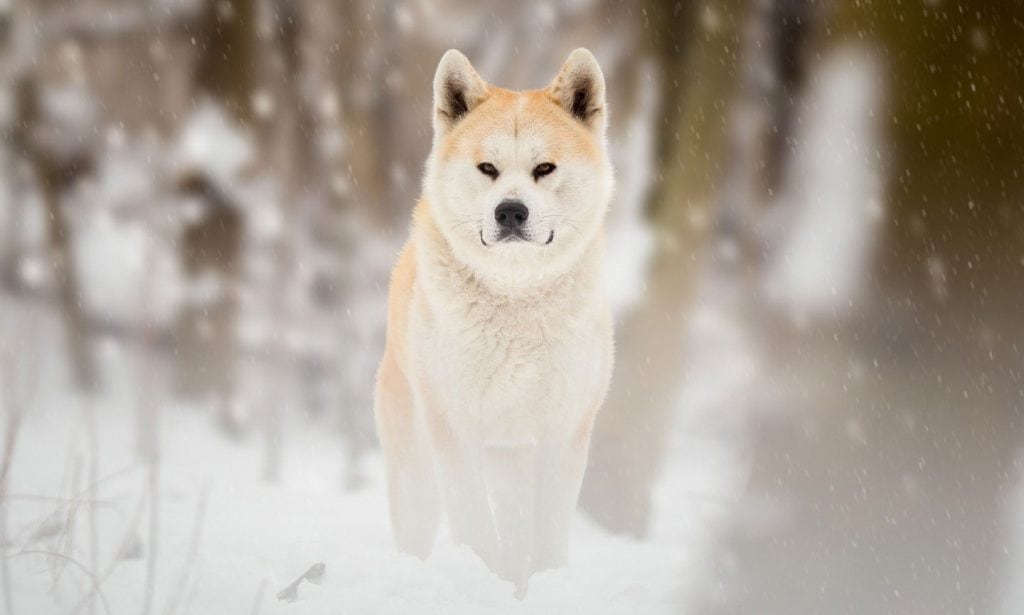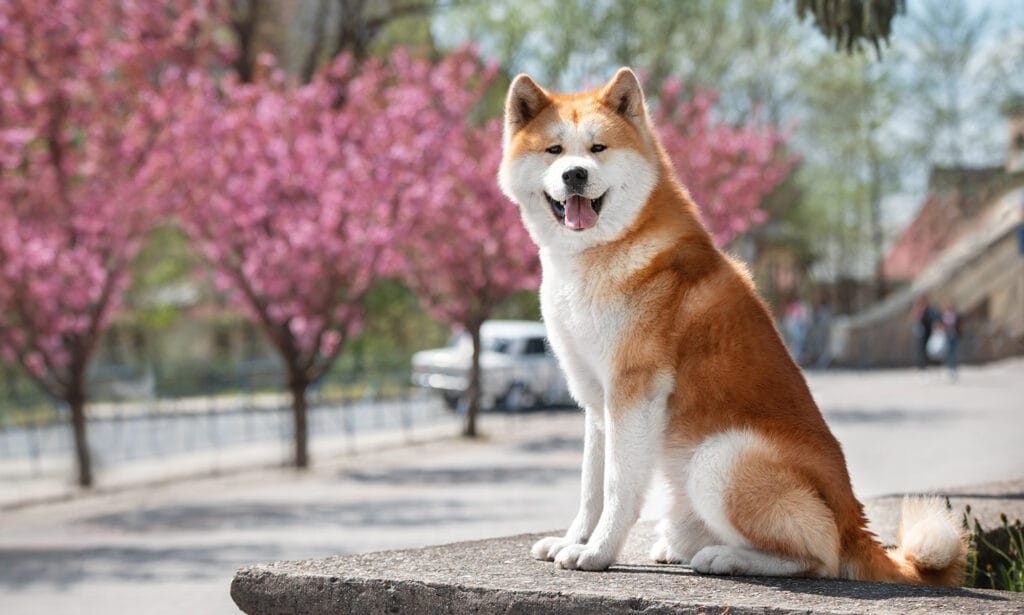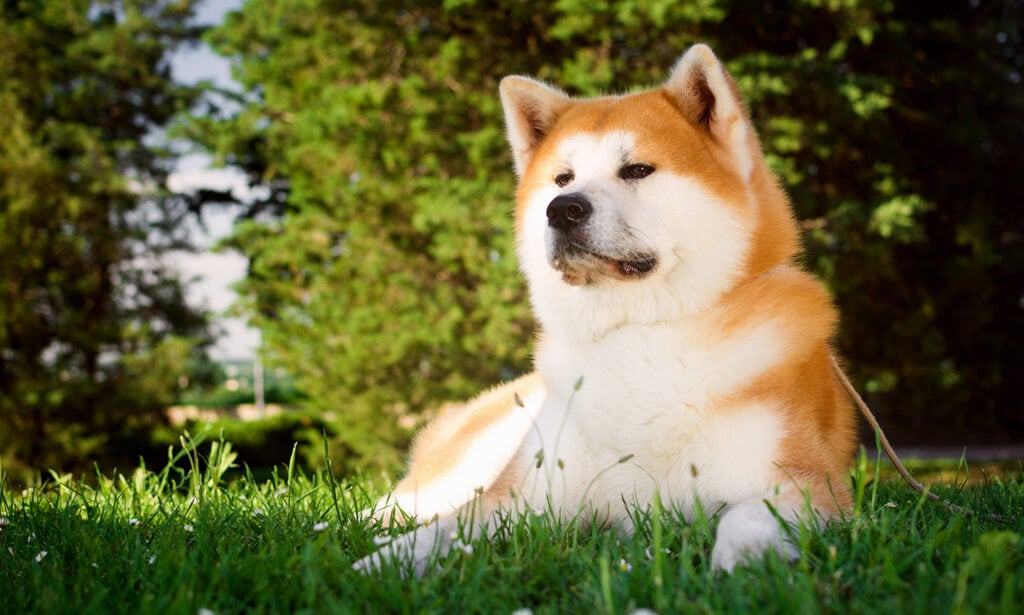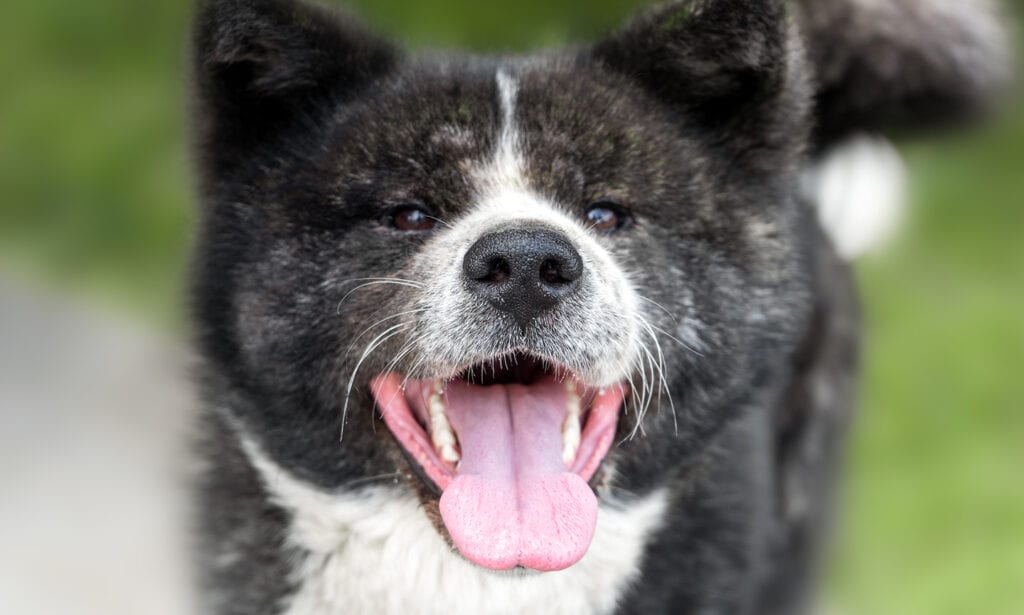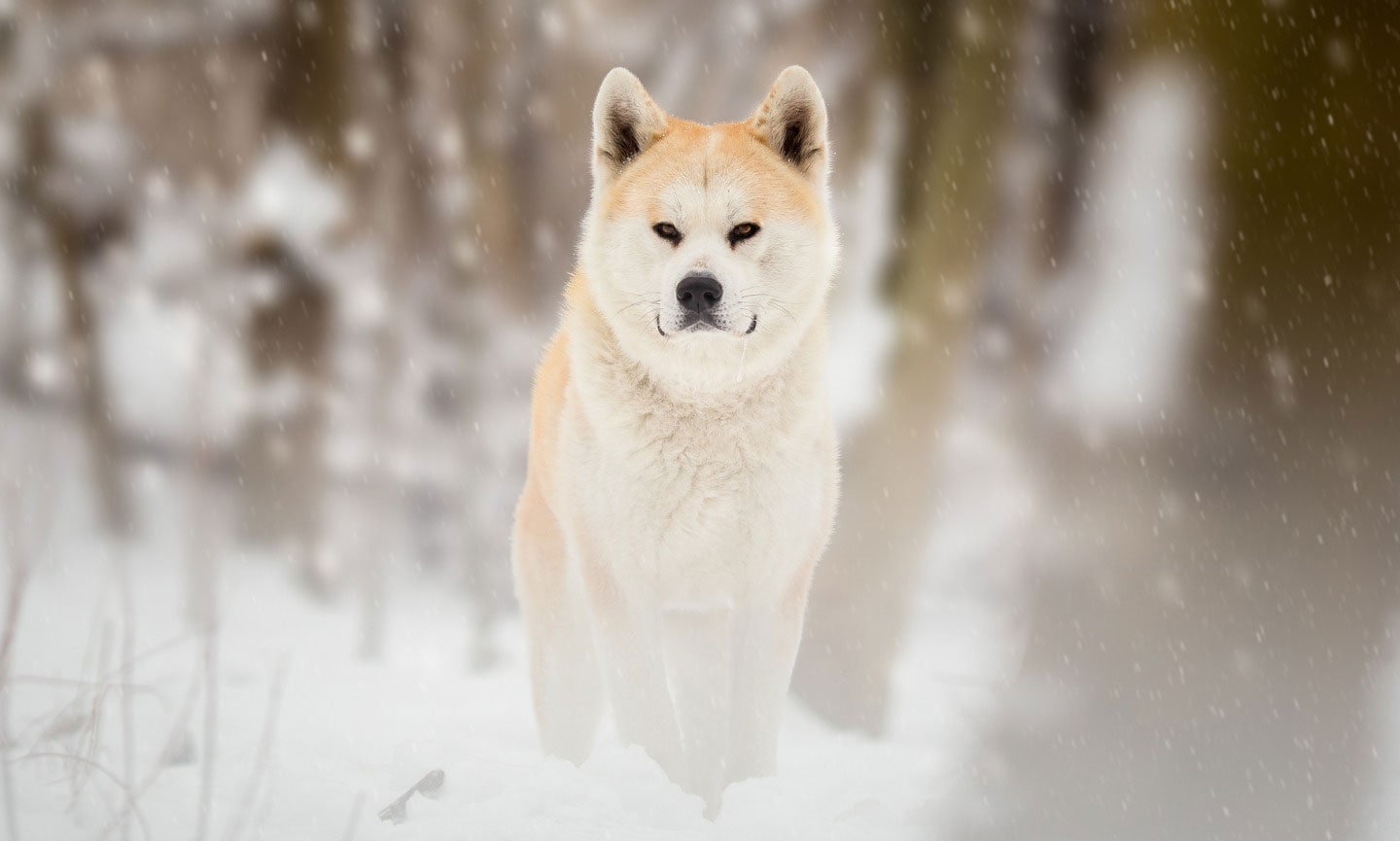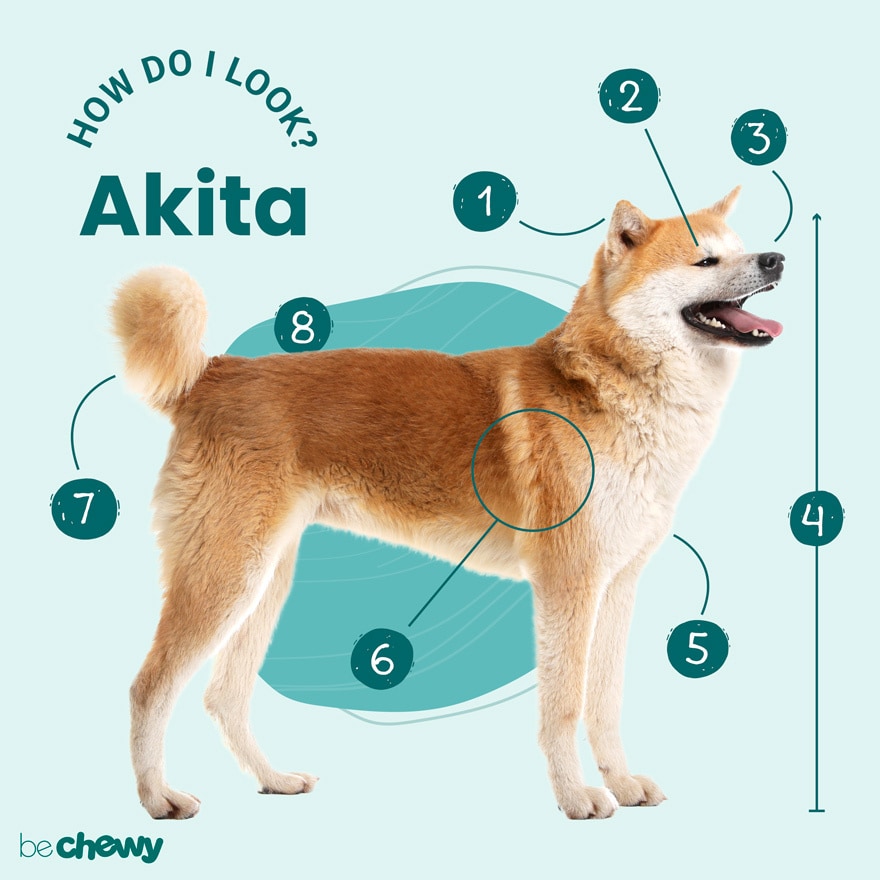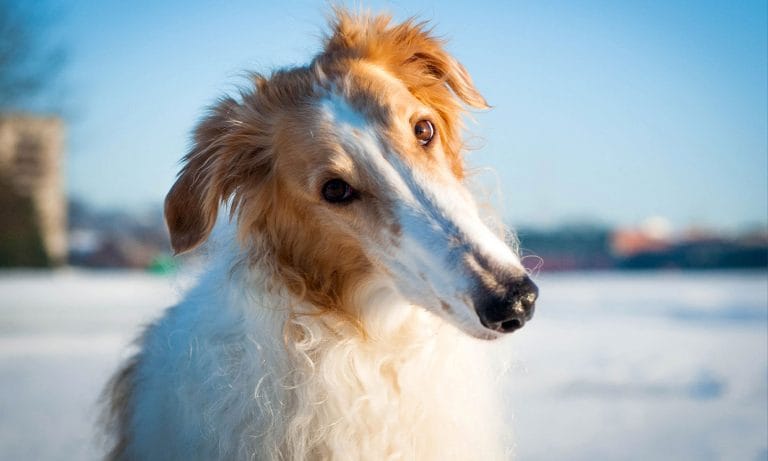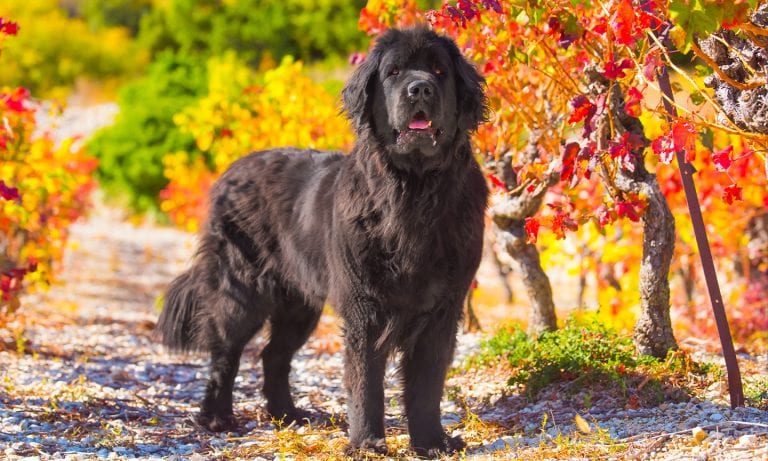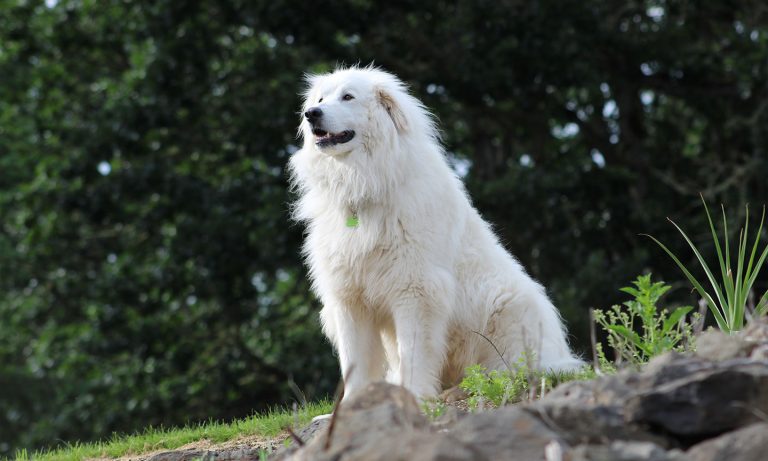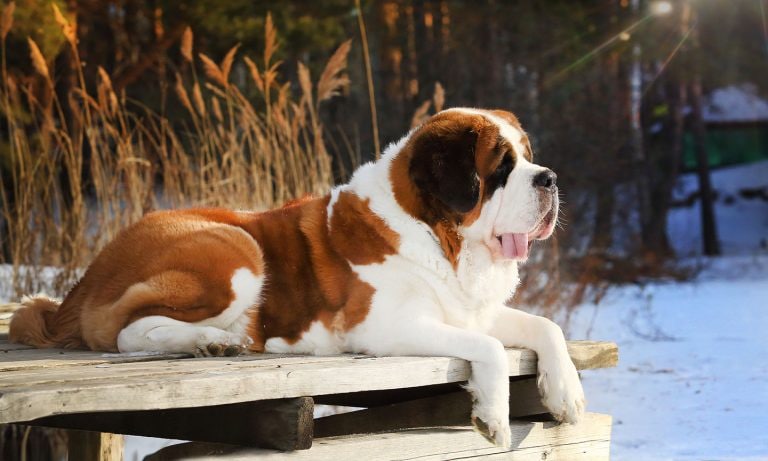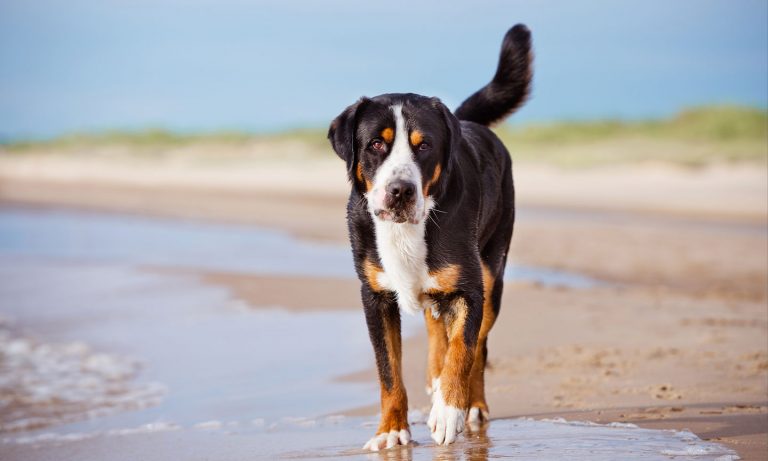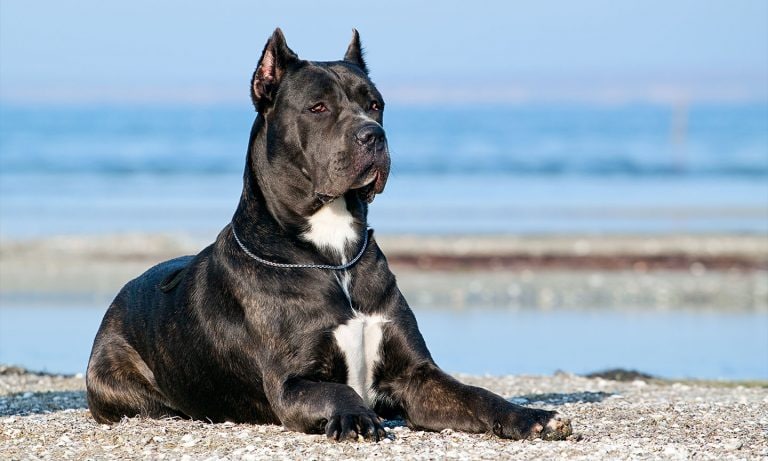If you secretly get excited when someone cancels plans or if you prefer the company of a few good friends over large social gatherings, then the Akita may be the dog for you. This furry, independent, quiet breed is a bit of an introvert and would enjoy lying low on a Friday night just as much as you. A loyal breed, Akitas bond deeply with their family. And while not the most social, they prefer to show their softer side to those they love the most. But hey, who needs a big crowd when you have each other?
Breed Snapshot
Temperament:
IntelligentIntrovertLoyalCoat Color:
BlackFawnRedWhiteBrown Brindle
Best For
Loyal and independent, Akitas are best for homes of any size with experienced pet parents who can provide long, daily walks and plenty of quality time. Consistent training and a committed pet parent contribute to a successful and loving Akita companionship.
Akita Temperament
Quiet and dignified, Akitas are loyal dogs who love spending time with their families. They’re intelligent and fairly energetic, so they’d enjoy both mental and physical activities, like going on long walks together or solving doggy puzzles.
Social butterflies they are not. Akitas often feel cautious around strangers. Because of their more aloof personality, they’ll benefit from extra socialization and training while growing up. Still, it’s best to supervise them closely around other pets or young children, especially once your pup is fully grown. Akitas may actually do best as the only pet in a home without small children or babies around.
Originally bred to serve as guard dogs, Akitas have a strong bite force and will monitor what’s going on in the home while they’re spending time with you. A good pup parent will provide proper training and socialization to ensure their dog knows the difference between a foe and friend.
How to Care for a Akita
Akitas thrive when they get lots of socialization as puppies so they can be well-adjusted, happy adult dogs. They need extra grooming when the seasons change but are surprisingly adept at keeping themselves clean. You’ll want to be cautious if you’re around strangers because they can be guarded and aloof. The good news is they’ll adapt wonderfully to a small or large home—as long as they can expend their energy going outside with you every day.
Akita Health
Akita dogs have a life expectancy of 10-14 years, but the breed does have a few health issues you’ll want to watch for to give them the longest lifespan possible. The best preventive measure is working with an Akita breeder who screens for these issues. Ask to see the test results of the litter you’re considering. If you’re rescuing your Akita from a shelter, make sure you get a copy of the dog’s wellness check.
- Hip Dysplasia: The Akita is a large breed in size and weight, so they are prone to hip dysplasia or other joint issues. Although hip dysplasia isn’t preventable, you can get your Akita’s hips tested. One of the key factors in reducing the effects of hip dysplasia is to keep your pup at a healthy weight. Ask your veterinarian if a supplement like glucosamine would be helpful or if there are any exercises to help keep the dysplasia from affecting your dog’s quality of life.
- Progressive Retinal Atrophy: Akitas can have eye problems. PRA is a genetic condition that can cause affected dogs to go blind. Unfortunately, there’s no cure. If caught early, you can have more time to prepare for and adjust to the condition.
- Von Willebrand Disease: The Akita breed can develop von Willebrand Disease, a bleeding disorder where the blood doesn’t clot well. If the dog loses a significant amount of blood, a transfusion is often needed. Your veterinarian can test your dog for this and help you know what precautions need to be taken
- Gastric Dilation and Volvulus (GDV): GDV (otherwise known as bloat) is a life-threatening condition that Akitas are more at risk for developing because of how deep and narrow their chests are. GDV occurs when the stomach is distended with gas and twists on itself. This is a medical emergency. If your pet is showing any signs of possible bloat, including dry-heaving, non-productive retching or abdominal distension, they should be seen by an emergency veterinarian immediately.
- Immune Disorders: Akitas are prone to several immune system disorders, including myasthenia gravis. This can cause weakness and fatigue. Your veterinarian can help you determine the best treatment options.
- Endocrine Disorders: Akitas are prone to hypothyroidism. This endocrine disease can cause weight loss, lethargy and hair loss but is typically easily managed with medication.
- Sebaceous Adenitis: Akitas can also develop skin-related immune disorders, like sebaceous adenitis, which can cause irritated skin, hair pigment changes and patchy hair loss. This can lead to skin infections if left untreated. Treatments range from omega-3 supplements and special shampoos to mineral baths and antibiotics. Talk to your veterinarian if you notice any symptoms.
Akita History
The Akita’s origin is from 17th century northern Japan when a banished nobleman was seeking to breed a loyal hunting dog. The Akita was bred to have characteristics that helped them hunt deer, boar and even local bears. The breed was close to extinction a few times; today, it’s seen as a symbol of health and happiness in Japan.
Helen Keller brought the first Akita to the United States after she was gifted one while visiting Japan in 1937. Although World War II slowed the breeds’ introduction to the United States, some soldiers brought Akitas back with them when they returned home.
The Akita was officially recognized by the AKC in 1972 when the breed entered the AKC’s Stud Book; they joined the Working group in 1973. (The dogs in this group were all bred to do specific jobs, like hunting or pulling sleds). Currently, there are two main types of Akitas: the more commonly known American Akita (or just Akita) and the Akitainu (meaning “dog”), also called the Japanese Akita. The AKC considers these two separate breeds: the Akita and the Japanese Akitainu.
Where is the best place to find Akita puppies today? You can find a list of reputable Akita breeders on the American Kennel Club’s website. The average Akita price can be anywhere from $600 to nearly $2,000 for an Akita puppy, depending on the breeder, pedigree papers and any health or temperament screenings performed. An Akita puppy with prize-winning parents might even cost up to $4,000. Akita rescue organizations can also help you find a purebred, or you can check your local shelters for Akitas to adopt. You can also search Chewy’s database of adoptable dogs in your area.
FAQs
Do Akitas shed?
Akitas shed a lot when the season changes from warm to cold or vice versa. They need daily brushing during this time. But outside of this, you only need to brush your Akita about once a week.
Are Akitas good with kids?
Akitas are good with kids if they are well socialized and trained. But they need to be supervised around young children. They may misunderstand their play and try to intervene. Akitas are more well-mannered if they’re raised around children and trained as a puppy, but it’s best to closely supervise Akitas when they’re with young kids and babies. You can also teach children how to properly interact with dogs.
What are the most popular Akita names?
Some of the most popular Akita names are Hiro, Yori, Yoshi, Sora, Kin, Michi, Sora, Hachiko, Tomy, Laila, Kimi, Natsumi, Yuzuki, Megumi, Jun, Akio, Taro and Kazuki. Get more dog names.
What are the most common Akita mixes?
The most common Akita mixes are:
- Akita-Husky mix (Huskita)
- Akita-German Shepherd mix (Akita Shepherd)
- Akita-American Pit Bull Terrier mix (Akita Pit)
- Akita-Labrador mix (Labrakita)
- Akita-Chow mix (Akita Chow)
- Akita-Rottweiler mix (Akita Rottie)
Note: These are not purebred dogs but mixed breeds.
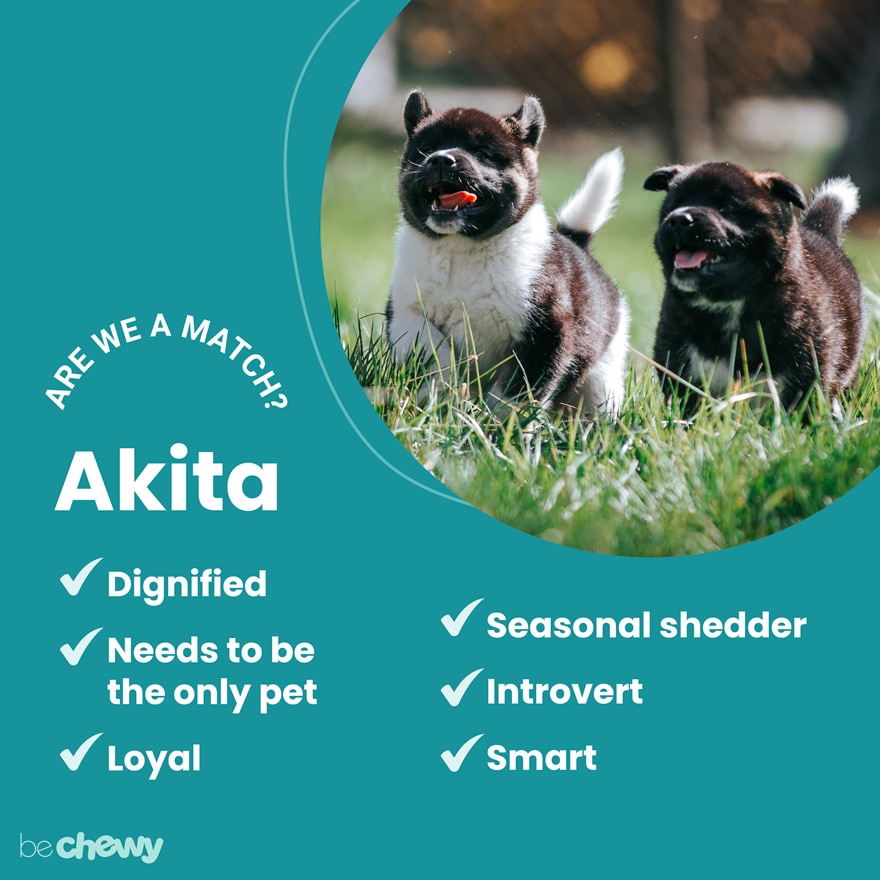
Top Takeaways
Akitas are loving, loyal pets who will happily provide you companionship and security. Most thrive best as an only pet in a home without young children, unless they’ve been well socialized. They may not love having strangers visit, but they make up for that in how much they love you.
Expert input provided by veterinarian Dr. Georgina Ushi Phillips, DVM, who writes the Not a Bully website.
Breed characteristic ratings provided by veterinarian Dr. Sarah J. Wooten, DVM, CVJ, a veterinarian at Sheep Draw Veterinary Hospital in Greeley, Colorado; dog trainer and behavior consultant Irith Bloom, CPDT-KSA, CBCC-KA, CDBC, owner of The Sophisticated Dog, LLC, in Los Angeles; and certified animal behavior consultant Amy Shojai, CABC, in Sherman, Texas.
The health content was medically reviewed by Chewy vets.

Search for Adoptable Akitas Near You
Female Names
- Luna
- Bella
- Sora
- Athena
- Kuma
- Lilo
- Suki
- Yuki
- Akira
- Mochi
Male Names
- Kuma
- Bear
- Koda
- Zeus
- Yoshi
- Kobe
- Milo
- Thor
- Loki
- Max
Share:
